‘He’s a miracle’: A local TV sports journalist gets a new heart, and a second chance
Jason Brown has been off the air in Charlotte for nearly six months.
When the local TV sports journalist returns to his job later this week at Spectrum News 1, he will do so with someone else’s heart beating in his chest.
In early March, Brown was in serious trouble, so much so that one of the options his family had to discuss with doctors was potential hospice care. After living with congestive heart failure for more than a decade, he was now dying from it.
“My heart was going bad,” Brown said.
But after being deemed a good candidate for a heart transplant, the 51-year-old Brown made the sort of fourth-quarter comeback he is always highlighting on TV. On March 16, 2023, he had a successful heart transplant in Charlotte, at Atrium Health Carolinas Medical Center.
“Since then, I’ve been sort of a recluse,” he said.
So if you’re wondering why you’ve not seen Brown on the air since late February? That’s why.
But now Brown is coming back. He is scheduled to return to work at Spectrum News 1 on Wednesday — staying in the office and away from crowded stadiums at first, masking up and maintaining the 10-medication, 22-pills-per-day regimen that helps ensure his new heart keeps working.
Jason Brown is a friend of mine. Let’s get that out of the way up front. And because it’s usually weird to call friends by their last names, I’m going to call him “Jason” for the rest of this column while describing this extraordinary comeback.
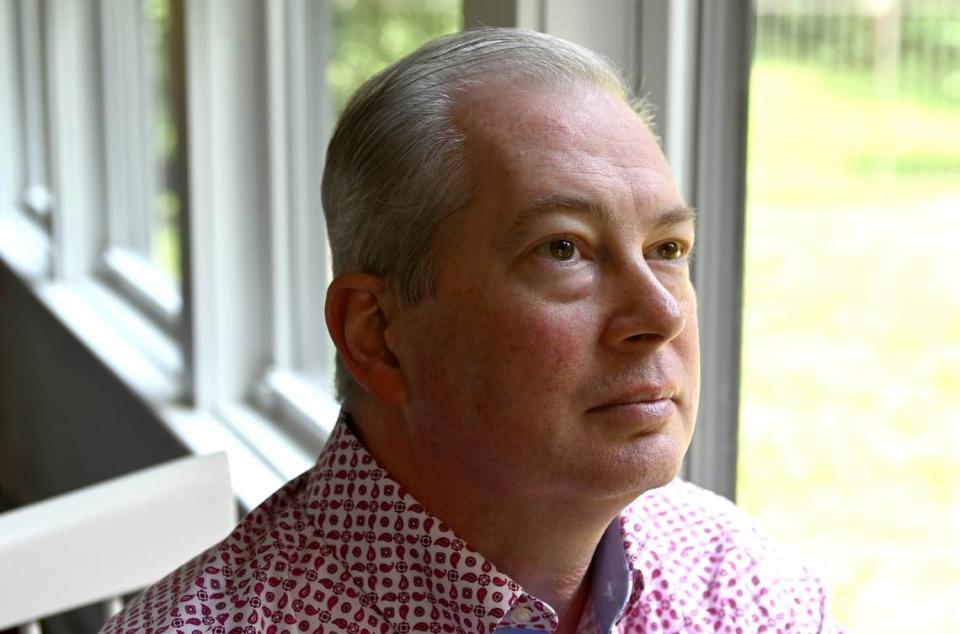
Sports journalists are supposed to be objective about every story they write. No cheering for the home team. It’s a good rule.
But I’m not objective about this story. Along with hundreds of others, I’ve been cheering for Jason since he was admitted into the hospital March 2, with a funereal gray skin tone and not long after having fainted at his own house. On March 25, he was discharged, with a new heart, an ultra-prepared but concerned wife, a happy dog, an eight-inch scar on his chest, a whole lot of instructions and a second chance at life.
“He’s a miracle,” said Claudine Chalfant, the regional managing editor for Spectrum News 1 and the person who drove Jason to the hospital in early March, when he got so sick that no one was sure whether he was going to make it to April. “He looked pretty terrible on March 2nd. And 23 days later, he’s walking around the neighborhood.”
The scariest day
Jason has kept a positive attitude almost all the way through, but parts of this medical odyssey have been terrifying. The scariest part? When he was being rolled away, toward heart transplant surgery. His wife, Christy Phillips-Brown, was the last familiar face he saw before he went under.
Said Jason: “Just looking at her, as they were wheeling me out … You just don’t know if that’s the last time you’re going to see her. Or anyone.”
Jason and I have talked a few times over the past few months. I wanted to tell his story when he was ready to have it told. I thought his medical journey, as well as his relentlessly positive outlook on life, would inspire some people.
He finally agreed, mainly because he wants to encourage people to become organ donors. Of North Carolina’s population of an estimated 10.7 million based on 2022 U.S. census figures, 5.8 million are registered donors according to LifeShare Carolinas. That works out to 54.2% of all residents. You can register while getting your driver’s license or online.
Organ donation was an integral part of Jason’s story, because someone made the decision to check that organ donation box on their own driver’s license one time, likely while at the DMV.
That person later died. And Jason now has that person’s heart. He doesn’t know whose heart he has or even what geographic area it came from, but he struggles with the whole idea of what has happened.
“It’s something I wrestle with in my conscience regularly,” Jason said. “Someone else had to pass, so that I can go on living.”
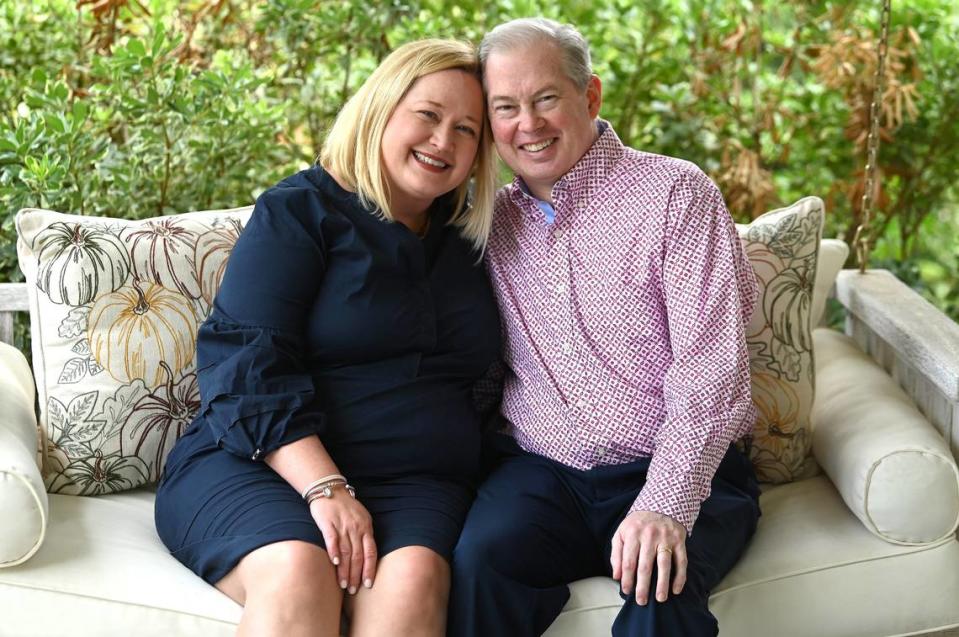
Jason and Christy have written a letter of gratitude to the donor’s family, one that will be addressed and delivered by others. The donor’s family can choose whether it ever wants to meet the Browns and to see the person in whom their loved one’s heart is still beating.
“I hope we get a chance to meet them,” Jason said. “I think about them a lot.”
In the meantime, Jason is getting better, bolstered by the friends, family and the former Panther players and coaches who have reached out to him. He’s had his new heart for a little more than five months now, long enough that his colleagues and friends have grown accustomed to the idea and razz him occasionally about it.
Said Mike Solarte, the Charlotte sports anchor at Spectrum News 1 and a colleague and friend of Brown’s for 20 years: “I like to tease Jason that he’s milking it. He’s like, ‘Oh, I’ve got a new heart, I can’t come back to work yet.’ Yeah, OK, it’s been five months. Let’s go already.”
That’s a joke, of course. In a more contemplative moment, Solarte said: “Jason is a guy with such a big heart that the only reason he needed a new one is that his own heart couldn’t handle the workload. To me, that’s what makes him a special person.”

‘He’s a grinder’
Is Jason’s transplant story one-of-a-kind? Thankfully, no.
Atrium Health boasts the only heart transplant center in the greater Charlotte region, and it’s busy. The transplant surgeons and their teams at Atrium Health Sanger Heart & Vascular Institute completed 51 heart transplants in 2022, the most they’ve ever accomplished in a single year, according to an Atrium spokesman. They are on track to eclipse that number in 2023 and have performed approximately 760 heart transplants altogether, since the hospital performed its first heart transplant procedure in 1986.
Among the more famous people who have received a heart transplant at Atrium Health in Charlotte: Former Panthers owner Jerry Richardson in 2009, who lived 14 years after his transplant before dying at age 86 in March 2023. Former NFL coach Sam Wyche also had a heart transplant at age 71 at Atrium Health in 2016 (Wyche would die in 2020). And in 2021, 8-year-old TJ Olsen, the son of former Panther standout tight end Greg Olsen, also had a successful transplant at Levine’s Children’s Hospital.
Exactly 1 week ago, the selfless act of a random stranger, our special angel donor, allowed TJ to share this news with his brother and sister.
Forever grateful ️
#tbt pic.twitter.com/rg5mh6Xsa3— Greg Olsen (@gregolsen88) June 10, 2021
I knew Jason the way you know a lot of people at work. You have a short biographical sketch of them in your head, but it’s black-and-white and the details aren’t filled in. I knew he had a wife, no children and a beloved dog (McKenzie, a spaniel mix). I knew that he and Solarte, with some help, put together a 30-minute sports show every night that ran from 10:30 to 11 p.m. on Spectrum News 1 called Chevrolet Sports Night. Solarte is the primary Charlotte anchor for that show, which is broadcast across the state. Jason fills in occasionally as the anchor but often reports from games.
I knew Jason was from Ohio, loved the Cincinnati Reds and was almost always smiling. I knew he seemed to constantly be in every press room in Charlotte where I was with camera in tow: Panthers, Charlotte Hornets, Davidson basketball, Charlotte 49ers football, Wells Fargo golf tournament, whatever.
“He’s a grinder,” Solarte said. “We call his position ‘multimedia journalist.’ He’s like a five-tool player in baseball. Shooting, reporting, writing, editing, anchoring — I mean, he just does it all.”

But health-wise, like all but his closest friends, I wasn’t sure what was going on with Jason.
He wore masks in the press box long after everyone else stopped. He protected himself with long sleeves and hats on 90-degree days and was seemingly very concerned about sunburn. He seemed a little tired sometimes. He did seem to cough a good bit sometimes. This, in particular, would worry his colleagues, who knew the persistent cough was usually a sign of something worse coming.
‘Who has a stroke at this age?’
What was wrong with Jason had really started in 2010, when he had a stroke at age 38. It was a mini-stroke, or transient ischemic attack (TIA), but it sure didn’t feel miniature at the time.
“We were like: ‘Who has a stroke at this age?’ ” Christy said.
Jason had just watched an episode of “Sherlock” on PBS and was letting a dog outside. “As soon as my foot hit the back porch, I slumped and my right side went heavy,” he said. “I dragged myself inside and sat down on the floor on the kitchen. I could only grunt.”
His wife took one look at him and called 911.
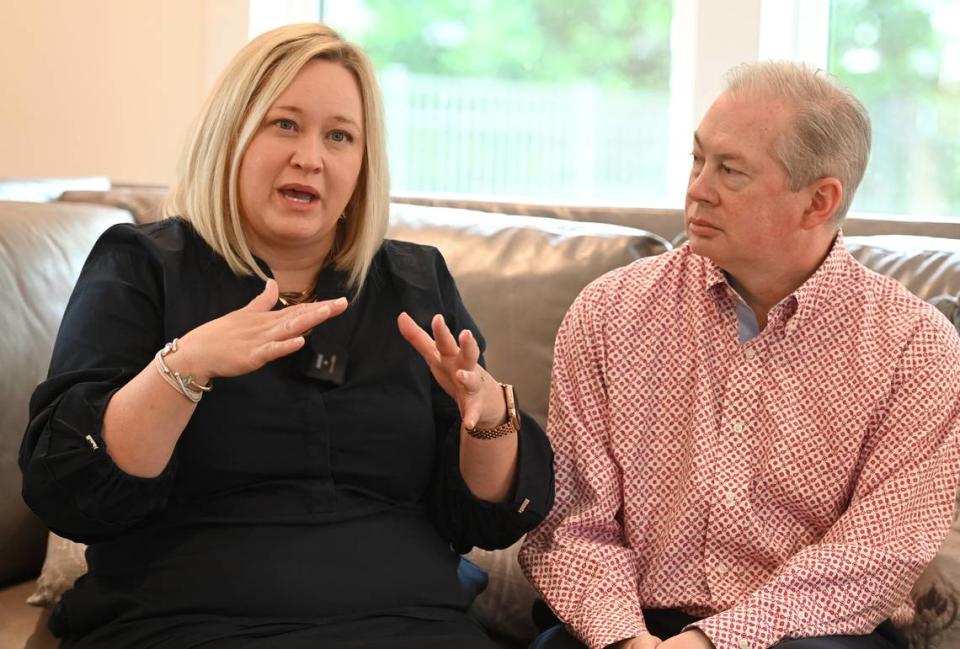
Fifteen minutes later, Jason was fine. He walked into the ambulance himself.
Doctors determined during a four-day hospital stay he had a heart issue, and it gradually got worse over the next few years. He had a defibrillator implanted. He was diagnosed with congestive heart failure. He made frequent trips to the cardiologist and learned terms like “atrial fibrillation” and “heart ejection fractions.”
But there was also stability. He was able to play softball and golf, and to work.
“I can’t say enough good things about the people who employ me,” Brown said. “They have said from the start: ‘Don’t worry about us. Don’t worry about the job. Take care of yourself.’ ”
For years, Jason lived with congestive heart failure, but he also had to start visiting an Atrium office called, rather ominously, “Advanced Heart Failure and Transplant Care.”
“We knew about the first one of those,” Jason said. “We hoped we’d never need the second.”
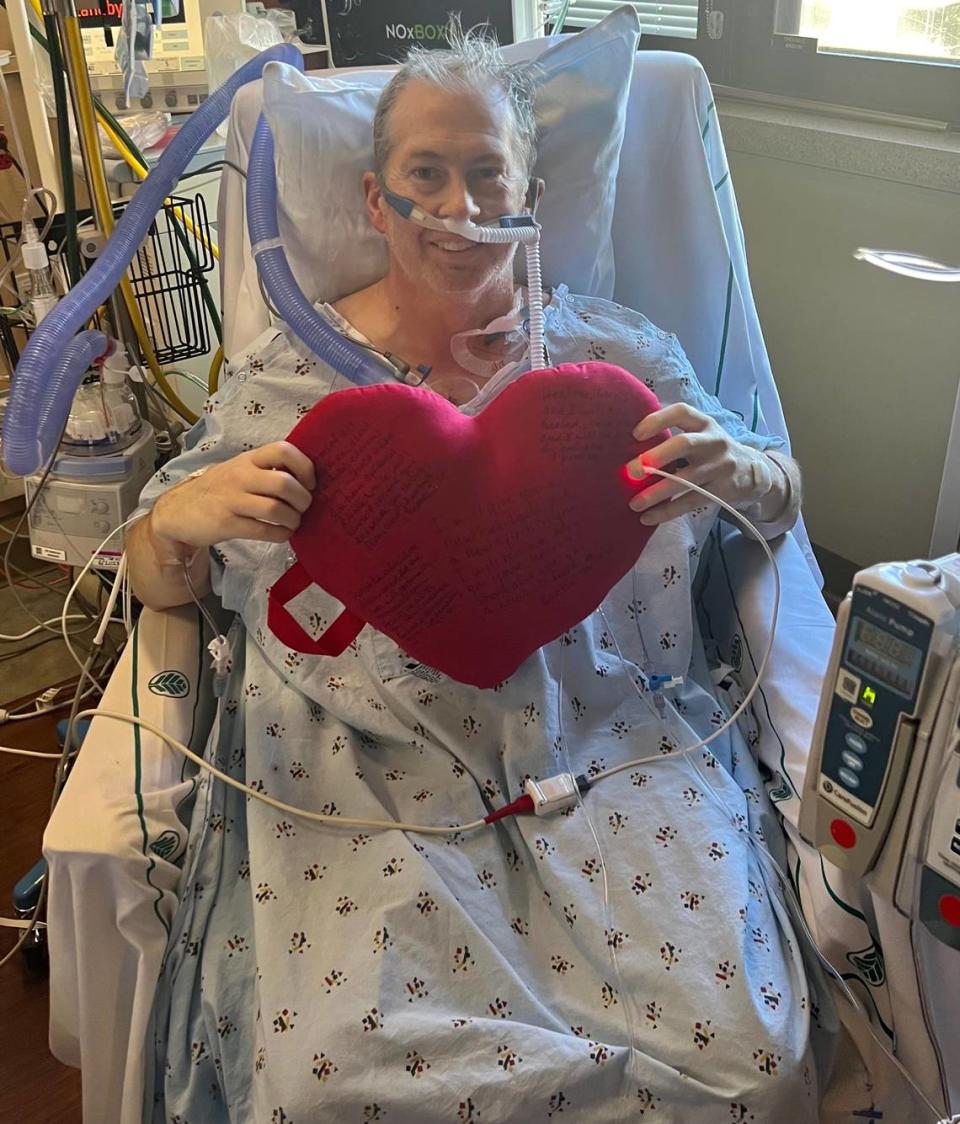
Not letting fear take over
To hear Jason tell it, the hero of this story is not himself, but his wife of 16 years, Christy. You know how everyone in the hospital needs an advocate, someone who can listen to the doctors and ask the right questions on the patient’s behalf?
For Jason, this was Christy, a communications specialist at work who soon became a communications specialist in the hospital, too.
She tried to get to the hospital by noon each day so she could meet with both Jason’s day nurse and night nurse. She kept a detailed log of every conversation with a doctor. She wrote down every medication and every instruction, for weeks on end. She prayed and mobilized her church group to pray with her. She kept friends and family informed via Facebook and email updates. When he went on life support, she got “very scared,” she said, but tried not to show it.
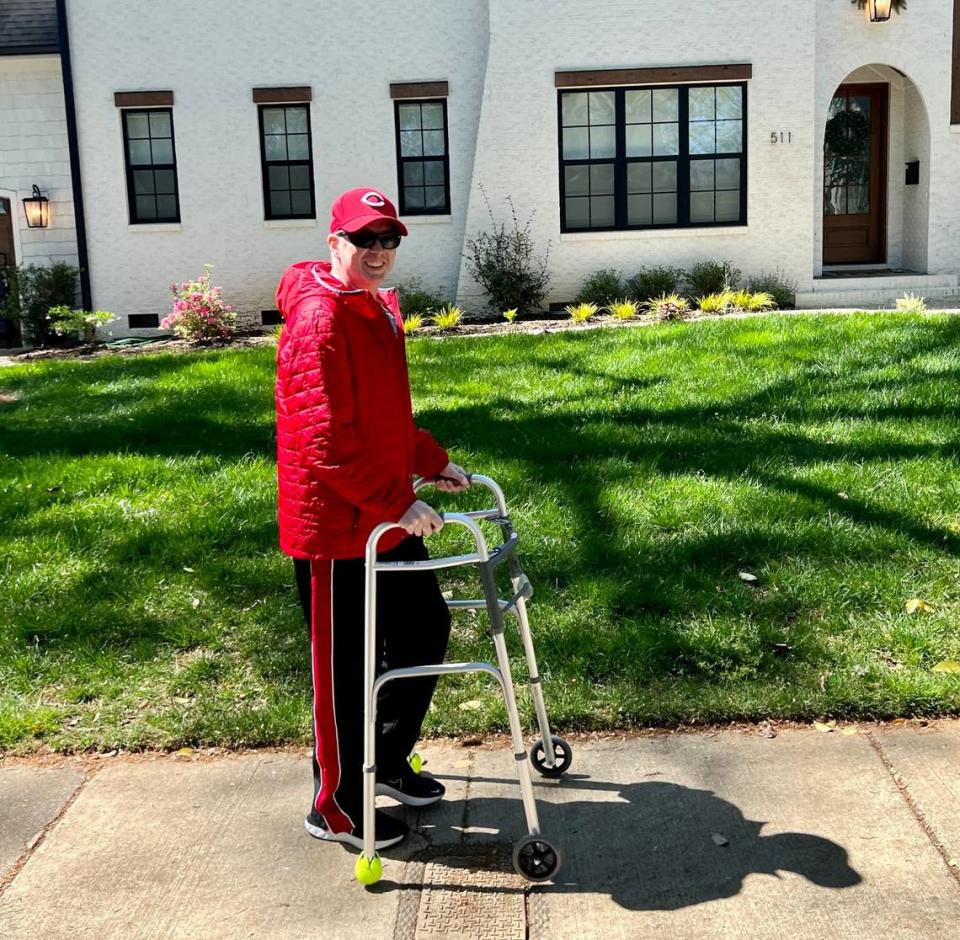
“I tried to never let fear take over,” she said. “I didn’t let the thought that I might lose him enter my mind. To keep my sanity and so I could do what he needed, I never let that enter.”
Still, she wasn’t omniscient. Once, shortly after the heart transplant during a time Jason was unable to speak, he started drawing a circle with his hands. It was like playing charades. What did he want?
Christy finally guessed it: to turn on the TV.
He nodded.
Then Jason drew another circle. What could this mean? Turn the volume up? Look at the channel guide?
Finally, Christy figured it out. He was drawing a golf ball, because he wanted to watch the Golf Channel.
One day, when it’s cooler, Jason would like to play golf again. His new heart may actually allow him to do things he wasn’t able to do with the old, damaged one.
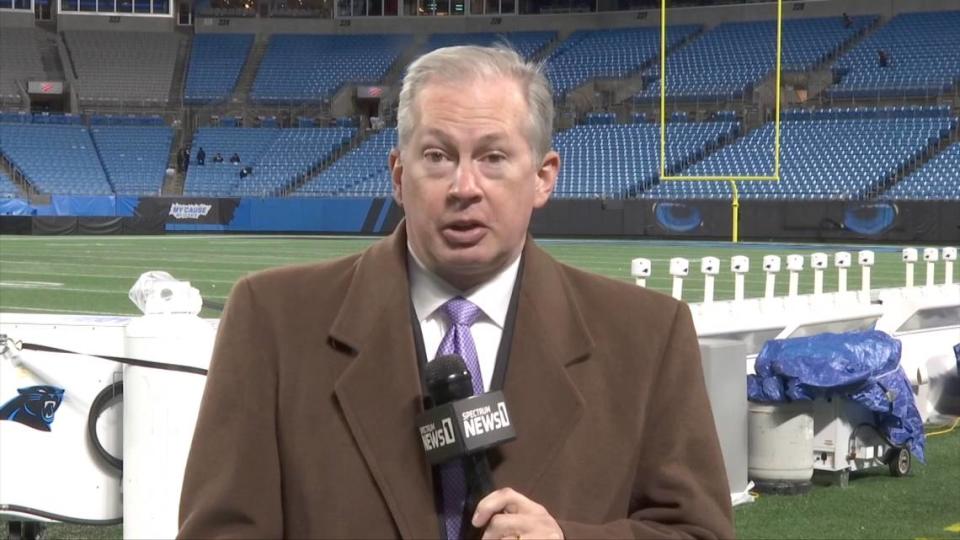
But for now, going back to work is enough. To sit in an office again. To fist-bump again (hugs, for now, are mostly off the table). To talk sports again. To get back to his life.
Jason’s new heart is a miracle. Everyone agrees with that. Now he’s ready to see what he can do with it.

